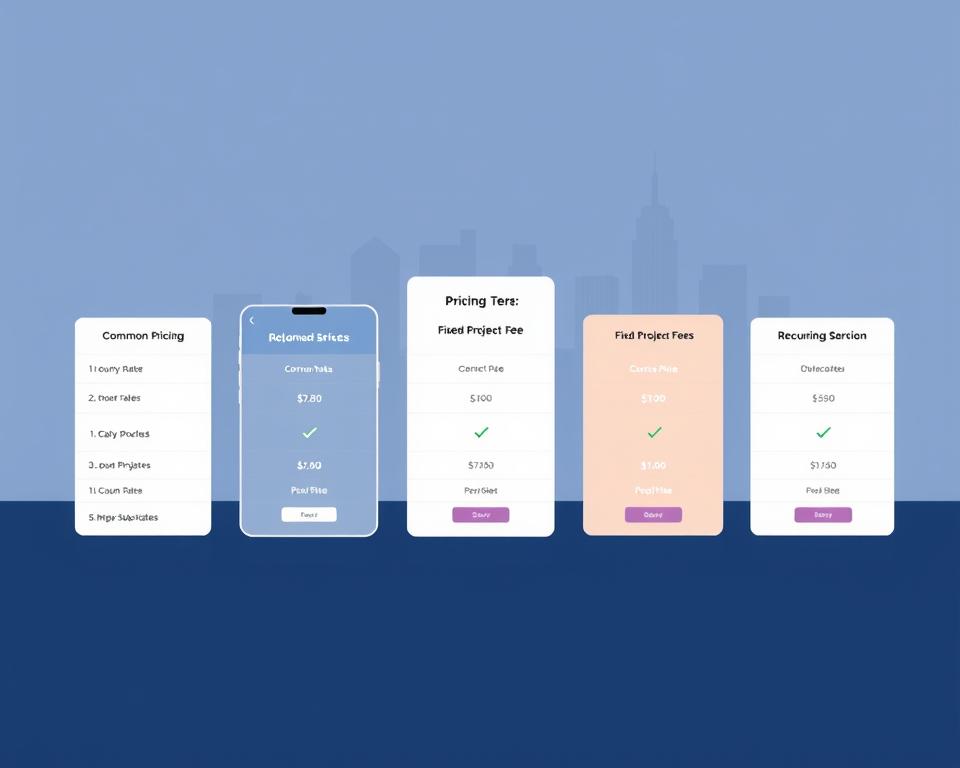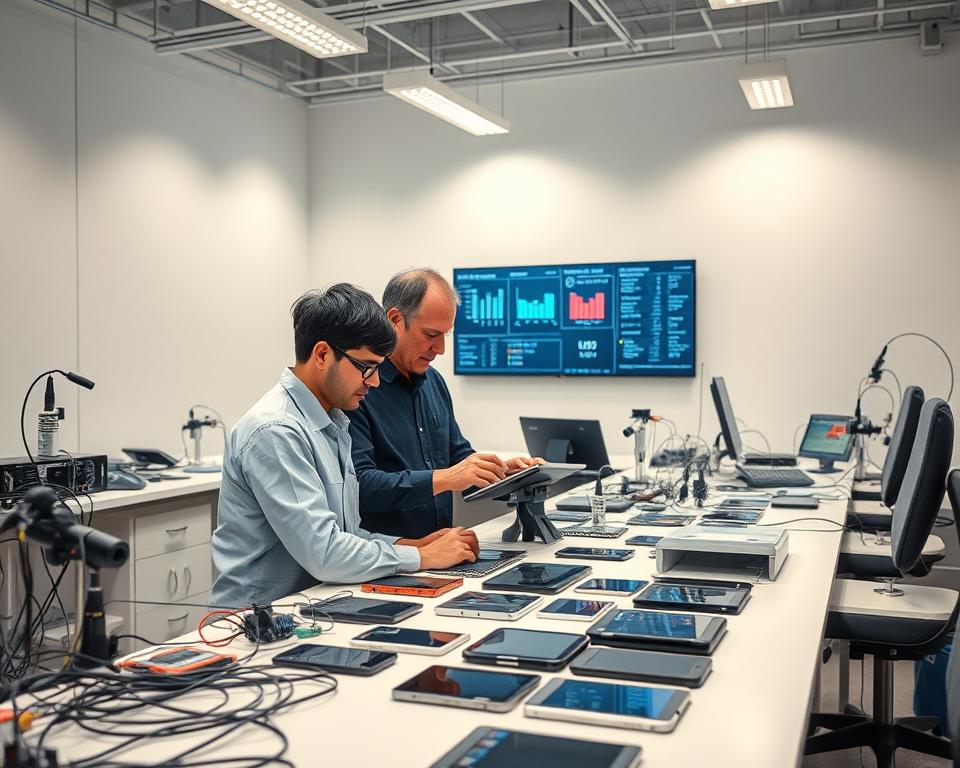When you’re looking to hire an app development company, it’s key to ask the right questions. This ensures you find a partner who can successfully complete your project. In today’s world, a well-made mobile app can greatly benefit businesses. So, investing in mobile app development is very important.
But, with so many software development companies out there, choosing the right one can be tough. It’s vital to carefully evaluate potential partners.
By asking the right questions, you can see if a company is experienced and skilled in app development. This way, you can be sure your project is in good hands.
Table of Contents
Key Takeaways
- Evaluate a company’s portfolio and experience in mobile app development.
- Assess their approach to project management and communication.
- Consider their expertise in your required technology stack.
- Review their testing and quality assurance processes.
- Understand their post-launch support and maintenance services.
The Critical Role of Selecting the Right Development Partner
Choosing the right development partner is key to your app’s success. A good partner makes sure your project runs smoothly. They meet your needs and what your users want.
How Your Choice Impacts Project Success
Choosing the right partner is crucial for your project’s success. A skilled partner uses the latest tech and best practices. This improves your app’s quality and makes development faster and cheaper.
The Cost of Making the Wrong Decision
Choosing the wrong partner can cost a lot. A bad project can lead to delays, poor quality, and even failure. Fixing these problems or starting over can be very expensive. It can also harm your business’s reputation.
So, it’s important to pick a development partner carefully. Look at their work, skills, and what others say about them. This way, you’ll get the best results for your project.
The App Development Landscape in 2023
The app development world is changing fast in 2023. New technologies and market needs are driving these changes. It’s important for businesses to keep up.
Emerging Technologies and Methodologies
New tech and methods are changing how apps are made. Some big trends include:
- Artificial Intelligence (AI) and Machine Learning (ML) for better user experiences
- Cross-platform development frameworks for easier app making
- Progressive Web Apps (PWAs) for better app performance and reach
These new tools are making apps more useful and helping businesses reach more people.
Current Market Challenges for Businesses
Even with new tech, businesses face big challenges. Some main issues are:
- More competition in the app market
- The need to keep innovating to stay competitive
- Ensuring hybrid mobile app development skills to meet different user needs
Knowing these challenges helps businesses navigate the app world better. It guides them in choosing the right development partner.
Preparing for Developer Interviews
When interviewing app development companies, knowing your project’s goals is key. This knowledge helps you pick the right partner. It also makes sure your project’s needs are met.
Defining Your Project Scope and Requirements
Defining your project scope means listing what your app will do and what it aims to achieve. You need to know who your app is for, where it will be used, and what tech it needs. A clear scope prevents extra work and makes sure the developer gets your vision.
Here are key things to think about for your project scope:
- Core features and functionalities
- User interface and user experience requirements
- Integration with existing systems or third-party services
- Security and compliance requirements
Setting Realistic Budgets and Timelines
It’s important to set budgets and timelines that are realistic. This means figuring out what resources you’ll need, how complex the project is, and what risks there might be. A good budget and timeline keep expectations in check and avoid delays or cost surprises.
Here’s a simple comparison of budget and timeline factors:
| Factor | Ideal Scenario | Realistic Scenario |
|---|---|---|
| Budget | $100,000 | $120,000 – $150,000 |
| Timeline | 6 months | 9 – 12 months |
Understanding these factors and preparing well leads to a smoother development process. This way, your project is more likely to succeed.
Question 1: What Is Your Development Process and Methodology?
It’s key to know how a development company works to see if they fit your project needs.
When looking at a potential partner, it’s important to understand their project management style. This includes their development process and methodology. These can greatly affect the project’s success.
Comparing Agile, Waterfall, and Hybrid Approaches
Each development method has its own strengths. Agile focuses on ongoing development and flexibility, making it good for projects that change. On the other hand, Waterfall is a linear method where each step is done before moving on. Hybrid mixes both, offering a balanced approach.
| Methodology | Key Characteristics | Best Suited For |
|---|---|---|
| Agile | Iterative, flexible, continuous improvement | Projects with changing requirements |
| Waterfall | Linear, sequential, predictable | Projects with well-defined requirements |
| Hybrid | Balanced, adaptable, structured flexibility | Projects requiring both structure and flexibility |
Process Adaptability and Flexibility
It’s important to see how adaptable a development company is. This means understanding their sprint planning and how they involve clients in the process.
Sprint Planning and Iteration Cycles
Agile companies use sprint planning to set goals and prioritize tasks. This makes it easier to adapt to changes.
Client Involvement Throughout Development
Getting clients involved is key to meeting their expectations. Regular updates and feedback help make adjustments as needed.
Question 2: Can You Share Your Portfolio and Case Studies?
Looking at a company’s portfolio and case studies shows their skills and what they can do. It’s key to see if they can handle your project well.
Analyzing Relevant Industry Experience
When checking a company’s portfolio, focus on their industry experience. Look for projects like yours or in the same field. This shows they get the unique challenges and needs of your project.
For example, if you’re making a healthcare app, a developer with healthcare experience is better. They know about rules and specific needs in that field.
Evaluating Technical Complexity of Past Projects
Looking at the technical complexity of past projects shows what a developer can do. Find projects with complex features, integrations, or new ideas. This helps you see if they can meet your project’s technical needs.
Questions to Ask About Showcased Apps
- What was the role of the development company in the project?
- What challenges did they face, and how did they overcome them?
- What technologies were used, and why?
Verifying App Store Presence and Performance
For apps on app stores, check if they’re there and how they’re doing. Look at ratings, reviews, and user feedback. This tells you about the app’s success and the developer’s quality.
Question 3: What Technologies and Platforms Do You Specialize In?
The success of your mobile app project depends on the technologies and platforms your chosen development company knows well. It’s important to understand their technical skills to ensure your project’s success.
Native vs. Cross-Platform Development Considerations
Choosing between native development and cross-platform development is a big decision. Native development means making separate apps for iOS and Android, using specific programming languages. Cross-platform development lets you create one app for many platforms, using tools like React Native or Flutter.
- Native development gives the best performance and direct access to device hardware.
- Cross-platform development saves time and resources by sharing code across platforms.
Backend Infrastructure and API Integration Capabilities
A strong backend infrastructure is key for handling data and API integrations. Your development company should be able to create a scalable backend that fits your app’s needs.
Technology Stack Compatibility
It’s crucial that the technology stack chosen by the development company works with your existing setup. For more tips on picking the right technology, visit Next Big Technology.
Future-Proofing Your App
The development company should think about future technologies and trends. They should plan for updates and integrations with new technologies to keep your app relevant and adaptable.
Question 4: How Do You Handle Project Management and Communication?
Knowing how an app development company manages projects and talks to clients is key for a good partnership. Good project management means the project is done on time, within budget, and meets quality standards.
Communication Channels and Reporting Structure
A top app development company has a solid communication plan. This includes regular updates and a clear reporting structure. They might use tools like Jira, Asana, or Trello, and also have video calls or email updates. The goal is to keep clients in the loop about the project’s status.
Milestone Tracking and Progress Transparency
Milestone tracking is vital in project management. The company should divide the project into smaller, easier-to-manage milestones. They should also give regular updates on how things are going. This makes sure clients know what’s happening and helps spot any problems early.
Client Portal and Real-Time Updates
A client portal is a great way to share real-time updates on the project. It lets clients see project schedules, task assignments, and progress reports. With a central platform, clients can stay updated and involved in the development process.
Handling Change Requests and Scope Adjustments
Project needs can change or grow over time. A flexible company can handle change requests and scope adjustments without messing up the timeline or budget. They need a clear process for making and implementing changes, and they should talk clearly with the client.
Question 5: What Is Your Pricing Structure and Payment Terms?
When picking an app development company, it’s key to ask about their pricing and payment terms. Knowing the financial side of your project helps with budgeting and avoids surprise costs.
Fixed Price vs. Time and Materials Models
App development firms usually stick to either a fixed price or time and materials model. The fixed price means you agree on a total cost upfront, giving you budget certainty. On the other hand, the time and materials model charges based on actual time and resources, offering flexibility for changing project needs.
Milestone-Based Payment Schedules
Many firms use a milestone-based payment schedule. This means you pay after reaching specific project milestones. It ensures you only pay for work that’s done.
Hidden Costs to Watch Out For
When looking at pricing, ask about hidden costs. These can include:
- Extra fees for project management tools
- Charges for extra revisions outside the initial plan
- Costs for testing and quality assurance
Budget Contingency Planning
It’s wise to plan for a contingency budget to cover unexpected costs. This way, your project stays financially on track, even with surprises.
By carefully looking at pricing and payment terms, you can choose a solution that fits your budget and goals.
Question 6: How Do You Approach Quality Assurance and Testing?
The success of your app depends on its quality. It’s important to know how your team tests and ensures quality. A good testing strategy makes your app reliable and user-friendly.
Automated vs. Manual Testing Methodologies
It’s key to understand if your team uses automated, manual, or both testing methods. Automated testing is great for checking if things work the same way after changes. It saves a lot of time. But, manual testing is better for finding new issues and checking how users feel about the app. Using both methods is usually the best way.
User Acceptance Testing Procedures
User Acceptance Testing (UAT) is a key step. It makes sure the app does what it’s supposed to and meets user needs. Knowing how your team does UAT is important.
“UAT is the final check before the app goes live, ensuring it meets user requirements and is free from critical bugs.”
UAT includes alpha and beta testing. Real users give feedback during these tests.
Performance and Security Testing
Performance testing checks how the app works under different conditions. Security testing finds weaknesses that hackers could use. It’s crucial for your app’s success and keeping user data safe.
Bug Tracking and Resolution Workflow
Knowing how bugs are handled is key. A clear bug tracking and fixing process shows a team’s maturity. It includes logging bugs, assigning them, and checking fixes.
Question 7: What Post-Launch Support and Maintenance Do You Offer?
It’s important to know what support and maintenance an app development company offers. This support helps your app run smoothly after it’s released. It includes many services to keep your app up and running.
Support Package Options and SLAs
A good app development company offers different support packages for various needs. These packages might include fast customer service, regular updates, and help with problems. It’s key to know the Service Level Agreements (SLAs) for each package. SLAs tell you how fast they’ll respond and fix issues.
When looking at support packages, think about what you need and if the SLAs meet your expectations. For example, a company with 24/7 support and quick response times is more reliable than one with limited hours.
App Store Management and Updates
Good app store management keeps your app visible and users happy. The company should update your app, manage reviews, and keep your app’s listing up-to-date and attractive.
Updates are also key. The company should have a way to regularly update your app. These updates should fix bugs, improve performance, and maybe add new features based on what users say.
Security Patch Implementation
Keeping your app secure is crucial. The development company should actively find and fix security issues. This keeps your app safe and follows the rules.
Feature Enhancement Process
A good company has a clear way to add new features. They listen to user feedback, decide what to add first, and make it happen. Knowing this process helps you plan for future updates and keeps your app relevant.
Question 8: How Do You Handle Intellectual Property and Confidentiality?
It’s important to know how an app development company handles intellectual property and confidentiality. This is key when you give them your project. You need to make sure your rights are safe.
Source Code Ownership and Rights
One big worry is source code ownership. You should know who owns the code after it’s done. Usually, the client owns it, but it can change. Make sure your contract says this to avoid problems later.
For more tips on picking the right developer, check out Next Big Technology.
NDA and Confidentiality Agreements
A good company will agree to a Non-Disclosure Agreement (NDA). This keeps your project’s secrets safe. It means they promise not to share your info.
Third-Party Component Licensing
It’s also key to know about third-party components. These are libraries or frameworks used in your app. Make sure you understand their licenses to avoid legal trouble.
Data Protection Compliance
Make sure the company follows data protection regulations. This means they stick to laws like GDPR or CCPA. This is important to keep user data safe.
By asking the right questions, you can protect your intellectual property and keep things confidential during development.
Question 9: What Is Your Team Structure and Expertise?
When you’re looking to hire an app development company, it’s key to ask about their team structure and expertise. Knowing who will work on your project can tell you a lot about their skills. This can help you see if they can make a top-notch product for you.
Team Composition and Specialized Roles
A good team has different roles like project managers, UX/UI designers, developers, and QA engineers. Each role is important for the project’s success. For example, a project manager keeps things moving and makes sure everyone is talking.
“A good project manager can make a significant difference in the success of your project.”
The development team should have both front-end and back-end developers. They should know the latest technologies and platforms.
Developer Experience and Qualifications
Checking the developers’ experience and qualifications is crucial. Look for teams with a good track record and experience in your field. You can look at their portfolio and ask for references to see if they’re telling the truth.
In-House vs. Outsourced Development
It’s also important to know if the development is done in-house or outsourced. In-house teams work directly for the company, while outsourced teams work for other companies. Both have their good and bad sides. For more info, check out our guide on 10 Questions to Ask Before Hiring a Mobile App Development.
Team Continuity Throughout the Project
Keeping the same team throughout the project is key to its success. A consistent team avoids losing knowledge and keeps the project moving. Make sure to ask how they plan to keep the team together and handle any changes.
Question 10: Can You Provide Client References?
Getting client references is key when you’re looking to hire an app development company. Client references give you valuable insights into how well a company does its job. They show if the company can meet deadlines and budgets, and if they communicate well.
Questions to Ask Previous Clients
When you talk to past clients, ask the right questions. Ask if the project was finished on time and if it stayed within budget. Also, find out about the team’s communication and project management skills. And, if there were any problems, how were they fixed?
Interpreting Client Feedback Effectively
When you read client feedback, look for patterns. Notice if there’s a lot of praise or criticism about certain things. It’s also important to think about the context of the feedback and what the client expected.
Red Flags in Testimonials
Watch out for testimonials that are too generic or don’t give details about the project. Red flags include testimonials that sound too good to be true or don’t mention any challenges.
Verifying Long-Term Client Relationships
To make sure client references are real, ask for references from clients who have worked with the company for a long time. This shows if the company can keep good relationships with its clients over time.
“The best way to get a sense of a company’s reliability is by talking to their previous clients.”
Top 10 Questions to Ask Before Hiring an App Development Company: A Checklist
Choosing the right app development company is crucial for success. A detailed checklist of questions helps you evaluate them better.
Using a printable interview guide is a smart move. It covers all key questions, keeping your search organized and thorough.
Printable Interview Guide
A printable interview guide is a great tool for assessing app development companies. It includes the top 10 questions and space for notes. For a sample project plan, check out Next Big Technology.
Response Evaluation Framework
When reviewing responses, use a framework to judge technical skills, communication, and project fit. The table below offers a simple framework for this.
| Criteria | Excellent | Good | Fair |
|---|---|---|---|
| Technical Expertise | Demonstrates in-depth knowledge | Shows good understanding | Lacks clarity |
| Communication Skills | Clear and concise | Generally clear | Unclear or confusing |
| Project Fit | Excellent fit | Good fit | Poor fit |
With a response evaluation framework, you can make a better choice for your app development needs.
Red Flags That Should Make You Reconsider
When looking at potential app development partners, watch for red flags. These signs can show if the developer might have problems. A red flag is anything that makes you doubt their ability to do the job well.
Warning Signs in Company Responses
Notice how a company answers your questions. Vague or evasive answers can mean they’re not open about their work. Also, be careful of companies that overpromise too much.
- Unclear or confusing explanations of their development process
- Unwillingness to provide references or case studies
- Overly aggressive sales tactics
When to Walk Away from a Potential Partnership
If you see many red flags, it’s time to think twice about the partnership. As
“The best way to get good ideas is to get a lot of ideas.”
– finding the right development partner is key. Sometimes, it’s best to choose a different path.
Listen to your gut and look for other options. Find a partner that fits your project’s needs and goals better.
Making Your Final Decision: Beyond the Questions
Choosing an app development company is more than just answering questions. It’s about looking at many factors that affect your project’s success.
Weighing Technical Expertise vs. Cultural Fit
When deciding, balance the company’s technical skills with how well they fit your culture. Technical expertise is key for a quality app that meets your needs. But, cultural fit helps the team understand your business and work better with you.
| Factor | Technical Expertise | Cultural Fit |
|---|---|---|
| Importance | High | High |
| Impact on Project | Directly affects app quality | Influences communication and collaboration |
Trust Your Instincts: The Intangible Factors
There are also things you can’t see that matter. Like how you feel about the company’s reliability and their excitement for your project. Listening to your gut can be as important as looking at what they offer.
Setting Expectations for Your Development Journey
Starting your app development journey? It’s key to set realistic goals. You need to know the project’s scope, timeline, and milestones. Also, understand your part in the development process.
Realistic Timeline and Milestone Planning
A good timeline is vital for your app’s success. Break the project into smaller, doable milestones. This helps you track progress, spot issues, and adjust as needed.
When planning your timeline, think about the project’s complexity, resource availability, and any dependencies.
Your Role in the Development Process
Your role in the project is crucial. As a stakeholder, you’ll make important decisions, give feedback, and ensure the team shares your vision.
For a smooth process, set up clear communication and reporting. This keeps you updated, lets you address concerns, and helps you make quick decisions.
Knowing your role and setting realistic timelines and milestones will help you succeed in app development.
Conclusion
Finding the right app development company is key to your project’s success. Knowing the development process and asking the right questions helps. This way, you can find a partner that meets your business needs.
Choosing the right development partner means looking at their approach, past work, technical skills, and how they communicate. Being well-informed helps you confidently choose the best for your project.
To succeed in app development, prepare well and know what you need. Look closely at potential partners and ask important questions. This will help your project thrive.



















